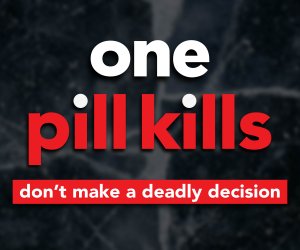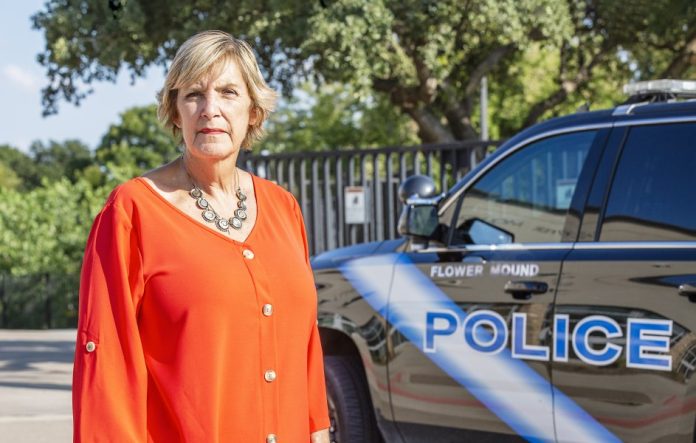As the founder of the local non-profit Winning the Fight, Kathy O’Keefe is used to standing in front of large assemblies of middle and high school kids to talk about the dangers of doing drugs. She’s worked one-on-one with grieving parents — many of whom lost a child to drugs as she did — and has even partnered with law enforcement and other organizations to raise awareness.
She thought she’d seen it all. But if O’Keefe is being 100% honest, her message these days has her petrified like never before.
All because of a drug that can kill an unsuspecting user, including kids, with one pill — fentanyl.
“We’ve always had a drug problem, but it’s incredibly scary now because younger age groups are getting their hands on it,” O’Keefe said. “It’s coming out in rainbow colors now, so it looks just like candy. But even if they think it’s ecstasy, they think they’re taking one drug when it’s actually something else. The reality is that 40% of confiscated drugs right now are laced with fentanyl. That means buying these drugs off the street gives you a 40% chance of dying from one pill.”
She added, “It’s a different game right now, and it’s frightening — absolutely frightening. This is coming to our community.”
The truth is — it’s already here.
Fentanyl is a synthetic opioid that is 50 to 100 times stronger than morphine, per the Drug Enforcement Agency. It was initially developed for pain management treatment for cancer patients, anesthesia, etc. but has now made its way into the illicit drug world disguised as legitimate prescription drugs, other illegal drugs, and even candy. Like other opioid analgesics, fentanyl produces effects such as relaxation, euphoria, pain relief, sedation, confusion, drowsiness, dizziness, nausea and vomiting, urinary retention, pupillary constriction, and respiratory depression. And it kills swiftly.
State and federal officials are warning families everywhere — including in southern Denton County — that fentanyl use, overdoses, and even deaths are in every suburb, HOA, gated community, and school bathroom. The Flower Mound Police Department made five fentanyl arrests in 2022 and responded to three overdoses.
They’ve referred larger cases to the DEA, which has also found itself cracking down on more cases locally.
“We work with a ton of different agencies, and there isn’t one we know that hasn’t been affected by fentanyl,” Flower Mound Police Sgt. James Pulis said. “The cases we see in our area involve people who are putting a pill on a piece of foil, lighting it with some kind of heat source, and inhaling the vapor. But that’s just in our area. In other areas, they see users crush the pills and snort them or straight up pop a pill. Our concern is that it’s ending up in much younger hands.”
 On a larger scale, Governor Greg Abbott sent a letter to state agencies on September 20 directing them to ramp up state efforts to combat what is now considered a national crisis. Fentanyl is being trafficked into Texas by Mexican cartels, and related deaths reported in Texas in 2021 increased by a staggering 89% compared to 2020.
On a larger scale, Governor Greg Abbott sent a letter to state agencies on September 20 directing them to ramp up state efforts to combat what is now considered a national crisis. Fentanyl is being trafficked into Texas by Mexican cartels, and related deaths reported in Texas in 2021 increased by a staggering 89% compared to 2020.
“Fentanyl’s potency and deceptiveness, combined with the federal government’s unwillingness to take border security seriously, pose a grave threat to Texans,” Abbot stated in the letter. “We must take all appropriate actions to inform Texans of this danger and prevent additional deaths. Together, we can help bring awareness to the threat posed by fentanyl and do our part to address this crisis.”
DEA officer Eduardo Chavez agreed, stating that the DEA’s tagline is: One Pill Can Kill.

“A major problem is that there’s no quality control with these pills,” he said. “The first pill off of the assembly line isn’t exactly the same as the millionth pill, so one pill could have .5 milligrams of fentanyl, and the next one could have three milligrams. This is a lethal dose. There’s no such thing as experimentation or ‘let me try this out’ with this drug.”
O’Keefe founded Winning the Fight 12 years ago after losing her son Brett to a drug overdose. While his death was unrelated to fentanyl, at least one WTF board member has lost a child to fentanyl. The current drug overdose epidemic as a whole kills more than 100,000 people annually, per the CDC. What’s more shocking is that number is an increase of 28.5% from the year before — even as public and private organizations, schools, healthcare professionals, therapists, government agencies, and police departments band together to offer education, support, and resources to individuals and families who need it most.
Winning The Fight provided counsel to 353 families and facilitated 340 referrals to therapists, treatment facilities, and more in 2021 alone. In 2014, they released a documentary film, “Not Me,” which tells the story of addiction experienced by eight local families. “Not Me” continues to be shown in schools and churches, and the Flower Mound Municipal Court uses the program for many who face charges for drugs and paraphernalia.
Winning The Fight also assists with anxiety workshops such as Just Breathe, therapeutic retreats, court programs, drug education, panel discussions, health classes, drug testing kits, recommended reading, and other support models such as AA and Smart Recovery. Their Better Safe Than Sorry program preaches the importance of locking up prescription and over-the-counter medications, keeping them out of others’ hands. WTF recently showed its latest documentary, “Just Once,” and included a panel discussion with the DEA, FMPD, and Recovery Resource.
“The schools are trying; everyone is trying. But I’m tired of the fentanyl deaths. By July this year alone, we lost four kids from the local area. And these were from families we were working with,” O’Keefe said. “A lot of parents think that it’s not going to happen to them, so they don’t attend these programs. They’ve also stopped watching the news or reading it because everything is so depressing. But that’s the only way we can get the information out. Parents need to figure out what’s happening in these programs because if they aren’t paying attention, what do we do?”
Chavez said the good news is that illicit fentanyl distribution has not invaded legit pharmacies. So if you receive a prescription for any drug through a legitimate professional and go to a reputable pharmacy, you’re getting the real thing. With that said, parents need to have difficult talks with their kids and other family members if they notice anything strange.
“When I speak to parents in this area, the conversation usually goes like this: ‘I knew something was bothering them or that something was off. But I thought it was just teenagers being teenagers, and I wasn’t willing to address the issue because I didn’t want to start another fight. I’m already fighting with my teenager about grades, sports, friends, etc., so I didn’t want to add one more thing,’” he said. “But they need to. You can’t afford to back down because the consequences are irreversible.”
In the meantime, O’Keefe said she would continue spreading the message and praying for a positive breakthrough.
The only question is if enough people are willing to listen.
“Fentanyl wasn’t always around. But now, it’s murder by poison,” she said. “It’s a scary conversation, but it’s important.”
Learn more about Winning The Fight at wtf-winningthefight.org.








 GIF.gif)









